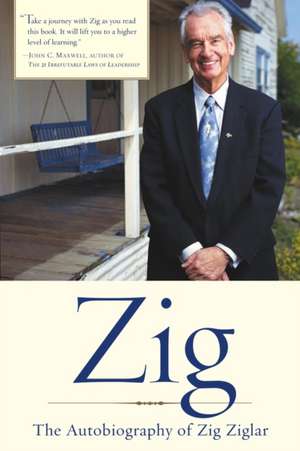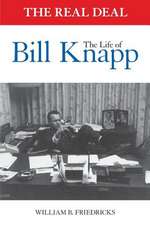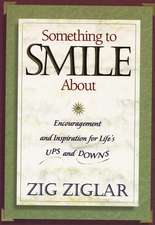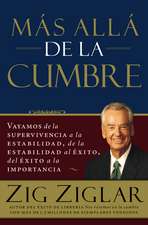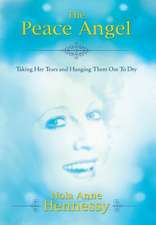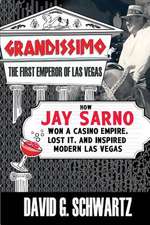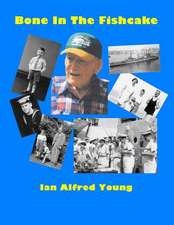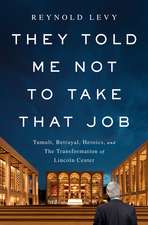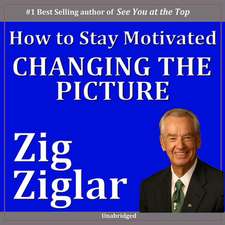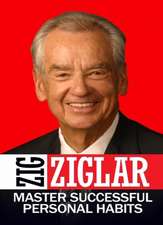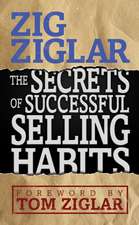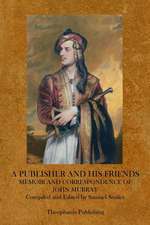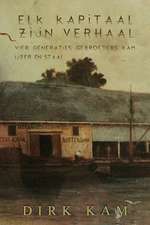Zig
Autor Zig Ziglar, Ziglaren Limba Engleză Paperback – 31 ian 2004
--Kenneth H. Cooper, M.D., The Cooper Clinic, Dallas, Texas
Zig Ziglar, the motivational speaker who has galvanized audiences around the world and written more than a dozen perennially popular books, brings that same unbounded energy and clarity of vision to this candid, inspiring account of his own life and the forces that shaped it.
Every year, Zig Ziglar travels all over the world delivering a resounding message of hope and commitment in forums ranging from high-powered business conferences and church leadership assemblies to youth conventions and educational gatherings. In Zig, Ziglar chronicles another kind of journey: his own transformation from a struggling, not terribly successful salesman to the sales champion of several different companies, and finally to his current position as one of the world's best-known and most highly regarded motivational speakers and trainers. As he describes his experiences, he brings to life the essence of his teachings: “You can have everything in life you want if you will just help enough other people get what they want.”
At the heart of Ziglar's story are the people who taught him the importance of balancing a commitment to hard work with compassion for others. His first teacher was his mother, who raised him alone after the early death of his father, and introduced him to the principles and values he has honored for the rest of his life. Her lessons were reinforced by many others–from the men and women who became his business mentors to the friends and spiritual leaders who comforted and supported him when things got tough. Paying tribute to each of them, Ziglar zeroes in on the philosophy and traits that have enabled him to achieve success in business and in his personal life: discipline, hard work, common sense, integrity, commitment, and an infectious sense of humor.
Ziglar's speaking engagements and seminars along with a wide array of audio and video materials, books, and training manuals, have helped to trigger positive changes in small businesses, Fortune 500 companies, U.S. government agencies, nonprofit associations, religious organizations, schools, and prisons. At once engaging and enlightening, Zig provides a riveting portrait of the man who has achieved so much by embracing the simple but profound goal of helping others.
From the Hardcover edition.
Preț: 109.63 lei
Nou
Puncte Express: 164
Preț estimativ în valută:
20.98€ • 21.88$ • 17.44£
20.98€ • 21.88$ • 17.44£
Carte disponibilă
Livrare economică 28 februarie-14 martie
Preluare comenzi: 021 569.72.76
Specificații
ISBN-13: 9780385502979
ISBN-10: 0385502974
Pagini: 272
Dimensiuni: 140 x 216 x 18 mm
Greutate: 0.36 kg
Editura: Galilee Trade
ISBN-10: 0385502974
Pagini: 272
Dimensiuni: 140 x 216 x 18 mm
Greutate: 0.36 kg
Editura: Galilee Trade
Notă biografică
Zig Ziglar is the author of twenty books on personal growth, leadership, sales, faith, family, and success, including See You at the Top, Raising Positive Kids in a Negative World, Over the Top, Success for Dummies, and Confessions of a Grieving Christian. He has received the National Speakers Association Master of Influence Award and the Toastmaster International Golden Gavel Award, as well as the coveted Cavett Award for his contribution to the speaking profession. He lives in Texas with his wife, Jean.
From the Hardcover edition.
From the Hardcover edition.
Extras
PART ONE
The Early Years
Mama Married Papa
When my mother, Lila Hannifew Wescott, was fifteen years old, she married my father, eighteen-year-old, John Silas "Judge" Ziglar. Their wedding date was December 18, 1902. They lived with Mama's parents, Ephram and Emily Wescott, for six months before they settled in south Alabama near what is currently the town of New Hope.
I'm told Mama was different from many young women of her time largely because of the influence of her mother--a successful merchant of sewing materials, sewing machines, and sewing machine parts. In the 1880s few women were independent or enterprising enough to have their own businesses--my grandmother was a true exception. Apparently she instilled her strong-willed personality arising out of her Irish background in Mama, because I never knew Mama to be at a loss over any circumstance.
It seems my mama's unusual background perfectly suited her for my entrepreneurial father. Papa farmed, owned a sawmill, operated and managed a shingle mill, and juggled several businesses simultaneously. He was a forebear of the successful work ethic later associated so closely with the 1940s and '50s in this country. My papa, John Silas Ziglar, was a man of action, who balanced family life well with his work.
As a family provider, Papa had few peers. He was never wealthy, but his energy and common sense guaranteed that our family never went without. Papa bartered his farmed goods with the people in our community; he drained and sold resin from pine trees; he took the excess syrup from his brother Oscar's cane mill, made cane juice, and developed a "route" where he put cans of cane juice in mailboxes early in the week and collected his money from the mailboxes later in the week. Papa often rode across the Alabama state line to Florida and bought (or traded for) fish, which he placed in iced barrels and delivered to people who had purchased them in advance. In those days no one had refrigerators and very few had ice boxes, so fresh fish had a special appeal. On more than one occasion Mama had to remind Papa to "stop at our house first," since his fresh Florida fish were in such demand.
The Judge
Papa earned his nickname, the Judge, for his ability to quickly differentiate right from wrong. In addition, he was not shy about sharing his opinion. He was umpire for the community weekend baseball games, and when the Judge spoke, there was no rebuttal.
As the story goes, on one occasion the home team traveled several miles for a game that erupted into a loud and prolonged argument over a disputed call by the local umpire. Both teams mounted horses or wagons or set out on foot to travel the distance between the field and our home. You can well imagine my mother's surprise when she answered the front door to find forty to fifty disgruntled baseball players and spectators demanding to see the Judge.
The competitors explained the situation. My father rendered his decision, and everyone left satisfied. Debating or questioning the Judge's decision never occurred to anyone. He was a thoughtful man possessed of great confidence. Everyone respected his intelligence, fairness, and judgment.
The Love of a Father
Our family was full of affection as Mama and Papa were both "huggers." When anyone visited our home, they were engulfed in hugs and surrounded by laughter and love. While Mama was known for the gravity of the few words she spoke, Papa was noted for being quite the talker. His quick wit and fun-loving ways created a joyful atmosphere.
I'm told that we used to pile on top of him when he'd arrive home from a "fishing expedition," demanding stories of his most recent adventures in Florida. The stories were always funny yet demonstrated the time-honored "southern traditions" of honesty, character, integrity, faith, loyalty, and love. Papa never missed an opportunity to teach his children the basics of moral living.
One of our family rituals was to ask Papa what day it was when he'd arrive home especially late. He'd always respond with, "Thursday, what's left of it," or "Wednesday, but not for long!," and all the children would smile and sometimes giggle with delight. On the rare occasions when Papa was going to be home for an entire day, he'd get up early, and when we asked him why he was getting up so early on his "day off," he would say, "If I'm not gonna do anything, I'm sure gonna get started early!"
I never wondered if my father loved me or my brothers and sisters. When any of us would ask to spend the night with a friend, he'd always say, "Invite them here! When I get home, I need my children to be here with me." His message was clear--not only did he cherish and love his children--he wanted them around him.
The Love of a Heavenly Father
In our home, the weekend activities revolved around the church. When the doors of the church opened, my mama and her children were there. Whenever possible, Papa was there, too, but his work and travel schedule often interfered.
One of the few (if not the only) disagreements that Mama and Papa ever had was about Sundays. It seems Papa umpired baseball games between Sunday morning and Sunday evening church services--an activity that Mama strongly felt was a distraction from God's day. The two of them often discussed the pros and cons of Papa continuing to umpire on Sunday, but God had the final word in the matter!
One Sunday afternoon, Papa called off a game in the late innings because the weather had become intolerable. As the players were leaving the field, lightning struck a tree near the center-field area, knocking three men to the ground. No one was injured, but Papa got the message. He went home and admitted to Mama that she was exactly right and there would be no more Sunday umpiring. Papa was willing to listen to a Higher Authority!
Brothers and Sisters
On May 4, 1906, my oldest sister, Amanda Lera Ziglar was born. The local doctor delivered her and all the children who followed, which was a significant fact because most children of that time came into the world with the aid of a midwife. My father wanted the best he could provide for Mama and his children, so he made sure there was enough fish, resin, cane juice, crops, or dollars to compensate the doctor fairly.
Two years later, on May 29, 1908, Lola Ziglar was born. On August 27, 1910, twin brothers, Willie Hubert and James Huie Ziglar arrived. Silas Houston Ziglar joined them on May 16, 1913.
On September 9, 1915, Emily Turah brought the count to three boys and three girls. Three years later, on March 15, 1918, Huel G. Ziglar (the G. was taken from Dr. E. G. Bragg, the physician who delivered most of the Ziglar children) put the boys in the lead until July 7, 1920, when Evia Jane Ziglar made the count four boys and four girls. Howard Huglar Ziglar put the boys in the lead for good on October 16, 1922.
Number Ten
On November 6, 1926, I arrived five weeks early--making me my mother's only premature baby. Dr. Bragg asked my parents if they had ever thought about how God had blessed them, pointing out that I was their tenth "perfect" child. I was named Hilary Hinton Ziglar, and now you know why I go by the name Zig.
When I was only nine days old, my oldest sister, Lera, gave birth to my mother's first grandchild, Lucille. Mama was extremely nervous about the whole situation and breathed a huge sigh of relief when she found out baby and mother were both doing well. It was shortly after that--just a matter of a few hours, I'm told--that Mama's feelings of joy about Lucille turned to stark terror over the fear of losing me. Apparently I had turned blue while Mama held me. She screamed for my sister Turah to get my grandmother. Maw, my papa's mother, was visiting to help with the children and chores while Mama recovered from having me.
Papa heard the commotion, and when he saw Mama's face and my skin tone, he ran the hundred yards across the road to fetch the doctor, who was still at Lera's house. When they got back to the house, I'm told, Mama was quietly crying, big tears pouring down her cheeks. The doctor, very concerned, picked me up and held my tiny body to his ear in an effort to hear breathing or a heartbeat. After a few silent moments he handed me back to Mama. He didn't utter a word, but I'm told his slumped shoulders and the look on his face plainly said that I was gone. The doctor looked at my father and slowly began to shake his head from side to side.
My grandmother understood that everyone thought I was dead, but she walked to my mother's bedside and said, "Please give me that baby."
She lifted me up and gently blew into my discolored face. Then she cradled me close to her body and began walking around the room, patting and rubbing my back. My sister Turah said the whole time you could hear her praying fervently, and even though you couldn't make out the words, you could tell she was in direct contact with my Maker. Then Turah said Maw stopped, blew in my face, and started the process over again. After what seemed an eternity, Maw stopped her primitive CPR and handed me back to Mama--all pink and breathing normally. It's said in the family that Maw's love and God's grace brought me back to life.
Since I had been born prematurely I was suffering from cyanosis, a malady that in my case was the result of incomplete lung expansion. The condition is often called "blue baby," because the baby looks blue due to the lack of oxygen in the blood. I've been told the story of my birth, death, and revival many times, and it has never failed to overwhelm me.
I well remember March 25, 1929, the day my little brother, Horace Judge Ziglar, was born. The winds had become so strong the chimney and fireplace in the room where Mama had Horace blew down. Luckily, they blew away from the house so no one was hurt, but the cold March winds came blowing in through the house and chilled everyone and everything. When I was twelve years old I told Turah how scared I was that day, and that during the worst of the storm, I remembered seeing someone carry Mama across the hall to the other, safer bedroom with a fireplace. Turah told me that that someone was my papa. This is one of the very few memories I have of Papa.
The Move to Mississippi
Shortly after Horace was born, Papa was offered and accepted a job managing a large farm for Mr. Pierce in the Mississippi Delta. His new duties required him to focus on farming, reduce his travel schedule, and manage the families that worked the land. After nearly twenty-eight years of marriage and eleven children, "settling down" seemed like a good thing to do, so in 1930 we made the move that created one of my earliest memories.
When we moved from Coffee County, Alabama, to the Mississippi Delta farm eight miles outside of Yazoo City, I was four years old. We had a flatbed truck with sides on it, and we loaded our furniture and the family on the truck. The roads were primarily mud and gravel, and it was a two-day trip. We made a sight right out of a WPA photo of those tough years in America. Nearly a dozen dusty children piled on top of everything we owned in the world moving on to what we hoped were greener pastures.
The first night we found an abandoned farmhouse along the side of the road, and moved in to spend the night and get something to eat. My mother had baked biscuits before we left and had brought some "salt meat," eggs, and milk. The old home had a fireplace, and we found some logs that had been cut to fit it stacked by the side of the house. Mama had her old iron skillet with her, so she fried the "salt meat" to go with the biscuits and eggs, and we had a fine meal.
My two older brothers, Hubert and Houston, both hunted during the trip, primarily for rabbits and squirrels, and neither indulged in target practice because every shell was important and represented a financial investment. They did not shoot unless they had an excellent chance of making it count. They referred to squirrels as "limb bacon," and "limb bacon" was a regular staple in our diet.
I also recall that the house we lived in when we got to Mississippi was on a lake outside of Yazoo City, although "swamp" would be a more appropriate description. My brother, Houston, set out some trotlines, and the night he hooked two large catfish was a happy occasion for us. As a child, I thought they looked huge, and I suspect they did weigh eight or ten pounds each. For our family that represented fried fish for two or three days, and catfish stew on at least one occasion.
Soon I discovered that lake was good for more than just fishing. Its uses were limited only by the extent of a small boy's active imagination. Shortly after we moved to the farm we went to one of the local churches on a Sunday evening. Since we've always been Baptist, I assume it was a Baptist church. At any rate, there were several baptisms that night. As best I can remember, the preacher was pretty loud, and as he baptized each person he said, "I now baptize you in the name of the Father, the Son, and the Holy Ghost!"
As a four-year-old, I was mighty impressed by this scene, and it gave me some ideas of my own. Since we lived out in the country, there were always a number of cats around the barns and grounds to control the mouse and rat populations. There were unsuspecting small kittens on the scene at this particular time, and some of them were handy. I proceeded, along with one of my buddies whose name has long ago been forgotten, to baptize those kittens in the same way we had seen the people baptized at church: "I now baptize you in the name of the Father, the Son, and the Holy Ghost," and bang! we would just throw them into the lake.
We had done this four or five times when my older sister Turah caught wind of what we were doing and put a stop to it pronto! I have forgotten exactly what happened after that, but I do know that was the one and only time cat baptisms were held at our place. Given our early age, it never occurred to us that we were abusing those kittens. But it is an instance that demonstrates something that I believe to this day. Kids will do what they see their parents and other adults doing. They are natural mimics. Obviously, as a four-year-old, I was in no position to baptize adults, so the kittens fell victim to my childhood shenanigans.
From the Hardcover edition.
The Early Years
Mama Married Papa
When my mother, Lila Hannifew Wescott, was fifteen years old, she married my father, eighteen-year-old, John Silas "Judge" Ziglar. Their wedding date was December 18, 1902. They lived with Mama's parents, Ephram and Emily Wescott, for six months before they settled in south Alabama near what is currently the town of New Hope.
I'm told Mama was different from many young women of her time largely because of the influence of her mother--a successful merchant of sewing materials, sewing machines, and sewing machine parts. In the 1880s few women were independent or enterprising enough to have their own businesses--my grandmother was a true exception. Apparently she instilled her strong-willed personality arising out of her Irish background in Mama, because I never knew Mama to be at a loss over any circumstance.
It seems my mama's unusual background perfectly suited her for my entrepreneurial father. Papa farmed, owned a sawmill, operated and managed a shingle mill, and juggled several businesses simultaneously. He was a forebear of the successful work ethic later associated so closely with the 1940s and '50s in this country. My papa, John Silas Ziglar, was a man of action, who balanced family life well with his work.
As a family provider, Papa had few peers. He was never wealthy, but his energy and common sense guaranteed that our family never went without. Papa bartered his farmed goods with the people in our community; he drained and sold resin from pine trees; he took the excess syrup from his brother Oscar's cane mill, made cane juice, and developed a "route" where he put cans of cane juice in mailboxes early in the week and collected his money from the mailboxes later in the week. Papa often rode across the Alabama state line to Florida and bought (or traded for) fish, which he placed in iced barrels and delivered to people who had purchased them in advance. In those days no one had refrigerators and very few had ice boxes, so fresh fish had a special appeal. On more than one occasion Mama had to remind Papa to "stop at our house first," since his fresh Florida fish were in such demand.
The Judge
Papa earned his nickname, the Judge, for his ability to quickly differentiate right from wrong. In addition, he was not shy about sharing his opinion. He was umpire for the community weekend baseball games, and when the Judge spoke, there was no rebuttal.
As the story goes, on one occasion the home team traveled several miles for a game that erupted into a loud and prolonged argument over a disputed call by the local umpire. Both teams mounted horses or wagons or set out on foot to travel the distance between the field and our home. You can well imagine my mother's surprise when she answered the front door to find forty to fifty disgruntled baseball players and spectators demanding to see the Judge.
The competitors explained the situation. My father rendered his decision, and everyone left satisfied. Debating or questioning the Judge's decision never occurred to anyone. He was a thoughtful man possessed of great confidence. Everyone respected his intelligence, fairness, and judgment.
The Love of a Father
Our family was full of affection as Mama and Papa were both "huggers." When anyone visited our home, they were engulfed in hugs and surrounded by laughter and love. While Mama was known for the gravity of the few words she spoke, Papa was noted for being quite the talker. His quick wit and fun-loving ways created a joyful atmosphere.
I'm told that we used to pile on top of him when he'd arrive home from a "fishing expedition," demanding stories of his most recent adventures in Florida. The stories were always funny yet demonstrated the time-honored "southern traditions" of honesty, character, integrity, faith, loyalty, and love. Papa never missed an opportunity to teach his children the basics of moral living.
One of our family rituals was to ask Papa what day it was when he'd arrive home especially late. He'd always respond with, "Thursday, what's left of it," or "Wednesday, but not for long!," and all the children would smile and sometimes giggle with delight. On the rare occasions when Papa was going to be home for an entire day, he'd get up early, and when we asked him why he was getting up so early on his "day off," he would say, "If I'm not gonna do anything, I'm sure gonna get started early!"
I never wondered if my father loved me or my brothers and sisters. When any of us would ask to spend the night with a friend, he'd always say, "Invite them here! When I get home, I need my children to be here with me." His message was clear--not only did he cherish and love his children--he wanted them around him.
The Love of a Heavenly Father
In our home, the weekend activities revolved around the church. When the doors of the church opened, my mama and her children were there. Whenever possible, Papa was there, too, but his work and travel schedule often interfered.
One of the few (if not the only) disagreements that Mama and Papa ever had was about Sundays. It seems Papa umpired baseball games between Sunday morning and Sunday evening church services--an activity that Mama strongly felt was a distraction from God's day. The two of them often discussed the pros and cons of Papa continuing to umpire on Sunday, but God had the final word in the matter!
One Sunday afternoon, Papa called off a game in the late innings because the weather had become intolerable. As the players were leaving the field, lightning struck a tree near the center-field area, knocking three men to the ground. No one was injured, but Papa got the message. He went home and admitted to Mama that she was exactly right and there would be no more Sunday umpiring. Papa was willing to listen to a Higher Authority!
Brothers and Sisters
On May 4, 1906, my oldest sister, Amanda Lera Ziglar was born. The local doctor delivered her and all the children who followed, which was a significant fact because most children of that time came into the world with the aid of a midwife. My father wanted the best he could provide for Mama and his children, so he made sure there was enough fish, resin, cane juice, crops, or dollars to compensate the doctor fairly.
Two years later, on May 29, 1908, Lola Ziglar was born. On August 27, 1910, twin brothers, Willie Hubert and James Huie Ziglar arrived. Silas Houston Ziglar joined them on May 16, 1913.
On September 9, 1915, Emily Turah brought the count to three boys and three girls. Three years later, on March 15, 1918, Huel G. Ziglar (the G. was taken from Dr. E. G. Bragg, the physician who delivered most of the Ziglar children) put the boys in the lead until July 7, 1920, when Evia Jane Ziglar made the count four boys and four girls. Howard Huglar Ziglar put the boys in the lead for good on October 16, 1922.
Number Ten
On November 6, 1926, I arrived five weeks early--making me my mother's only premature baby. Dr. Bragg asked my parents if they had ever thought about how God had blessed them, pointing out that I was their tenth "perfect" child. I was named Hilary Hinton Ziglar, and now you know why I go by the name Zig.
When I was only nine days old, my oldest sister, Lera, gave birth to my mother's first grandchild, Lucille. Mama was extremely nervous about the whole situation and breathed a huge sigh of relief when she found out baby and mother were both doing well. It was shortly after that--just a matter of a few hours, I'm told--that Mama's feelings of joy about Lucille turned to stark terror over the fear of losing me. Apparently I had turned blue while Mama held me. She screamed for my sister Turah to get my grandmother. Maw, my papa's mother, was visiting to help with the children and chores while Mama recovered from having me.
Papa heard the commotion, and when he saw Mama's face and my skin tone, he ran the hundred yards across the road to fetch the doctor, who was still at Lera's house. When they got back to the house, I'm told, Mama was quietly crying, big tears pouring down her cheeks. The doctor, very concerned, picked me up and held my tiny body to his ear in an effort to hear breathing or a heartbeat. After a few silent moments he handed me back to Mama. He didn't utter a word, but I'm told his slumped shoulders and the look on his face plainly said that I was gone. The doctor looked at my father and slowly began to shake his head from side to side.
My grandmother understood that everyone thought I was dead, but she walked to my mother's bedside and said, "Please give me that baby."
She lifted me up and gently blew into my discolored face. Then she cradled me close to her body and began walking around the room, patting and rubbing my back. My sister Turah said the whole time you could hear her praying fervently, and even though you couldn't make out the words, you could tell she was in direct contact with my Maker. Then Turah said Maw stopped, blew in my face, and started the process over again. After what seemed an eternity, Maw stopped her primitive CPR and handed me back to Mama--all pink and breathing normally. It's said in the family that Maw's love and God's grace brought me back to life.
Since I had been born prematurely I was suffering from cyanosis, a malady that in my case was the result of incomplete lung expansion. The condition is often called "blue baby," because the baby looks blue due to the lack of oxygen in the blood. I've been told the story of my birth, death, and revival many times, and it has never failed to overwhelm me.
I well remember March 25, 1929, the day my little brother, Horace Judge Ziglar, was born. The winds had become so strong the chimney and fireplace in the room where Mama had Horace blew down. Luckily, they blew away from the house so no one was hurt, but the cold March winds came blowing in through the house and chilled everyone and everything. When I was twelve years old I told Turah how scared I was that day, and that during the worst of the storm, I remembered seeing someone carry Mama across the hall to the other, safer bedroom with a fireplace. Turah told me that that someone was my papa. This is one of the very few memories I have of Papa.
The Move to Mississippi
Shortly after Horace was born, Papa was offered and accepted a job managing a large farm for Mr. Pierce in the Mississippi Delta. His new duties required him to focus on farming, reduce his travel schedule, and manage the families that worked the land. After nearly twenty-eight years of marriage and eleven children, "settling down" seemed like a good thing to do, so in 1930 we made the move that created one of my earliest memories.
When we moved from Coffee County, Alabama, to the Mississippi Delta farm eight miles outside of Yazoo City, I was four years old. We had a flatbed truck with sides on it, and we loaded our furniture and the family on the truck. The roads were primarily mud and gravel, and it was a two-day trip. We made a sight right out of a WPA photo of those tough years in America. Nearly a dozen dusty children piled on top of everything we owned in the world moving on to what we hoped were greener pastures.
The first night we found an abandoned farmhouse along the side of the road, and moved in to spend the night and get something to eat. My mother had baked biscuits before we left and had brought some "salt meat," eggs, and milk. The old home had a fireplace, and we found some logs that had been cut to fit it stacked by the side of the house. Mama had her old iron skillet with her, so she fried the "salt meat" to go with the biscuits and eggs, and we had a fine meal.
My two older brothers, Hubert and Houston, both hunted during the trip, primarily for rabbits and squirrels, and neither indulged in target practice because every shell was important and represented a financial investment. They did not shoot unless they had an excellent chance of making it count. They referred to squirrels as "limb bacon," and "limb bacon" was a regular staple in our diet.
I also recall that the house we lived in when we got to Mississippi was on a lake outside of Yazoo City, although "swamp" would be a more appropriate description. My brother, Houston, set out some trotlines, and the night he hooked two large catfish was a happy occasion for us. As a child, I thought they looked huge, and I suspect they did weigh eight or ten pounds each. For our family that represented fried fish for two or three days, and catfish stew on at least one occasion.
Soon I discovered that lake was good for more than just fishing. Its uses were limited only by the extent of a small boy's active imagination. Shortly after we moved to the farm we went to one of the local churches on a Sunday evening. Since we've always been Baptist, I assume it was a Baptist church. At any rate, there were several baptisms that night. As best I can remember, the preacher was pretty loud, and as he baptized each person he said, "I now baptize you in the name of the Father, the Son, and the Holy Ghost!"
As a four-year-old, I was mighty impressed by this scene, and it gave me some ideas of my own. Since we lived out in the country, there were always a number of cats around the barns and grounds to control the mouse and rat populations. There were unsuspecting small kittens on the scene at this particular time, and some of them were handy. I proceeded, along with one of my buddies whose name has long ago been forgotten, to baptize those kittens in the same way we had seen the people baptized at church: "I now baptize you in the name of the Father, the Son, and the Holy Ghost," and bang! we would just throw them into the lake.
We had done this four or five times when my older sister Turah caught wind of what we were doing and put a stop to it pronto! I have forgotten exactly what happened after that, but I do know that was the one and only time cat baptisms were held at our place. Given our early age, it never occurred to us that we were abusing those kittens. But it is an instance that demonstrates something that I believe to this day. Kids will do what they see their parents and other adults doing. They are natural mimics. Obviously, as a four-year-old, I was in no position to baptize adults, so the kittens fell victim to my childhood shenanigans.
From the Hardcover edition.
Recenzii
“Zig Ziglar is absolutely one of the most amazing people God ever created! He has been the Billy Graham of encouragement and motivation for untold numbers of people around the world. His autobiography is just that- a book that will encourage you and motivate you to be all that your Heavenly Creator wants you to be. Read it and you will surely find yourself at the top!”
--James Merritt, president of the Southern Baptist Convention
From the Hardcover edition.
--James Merritt, president of the Southern Baptist Convention
From the Hardcover edition.
